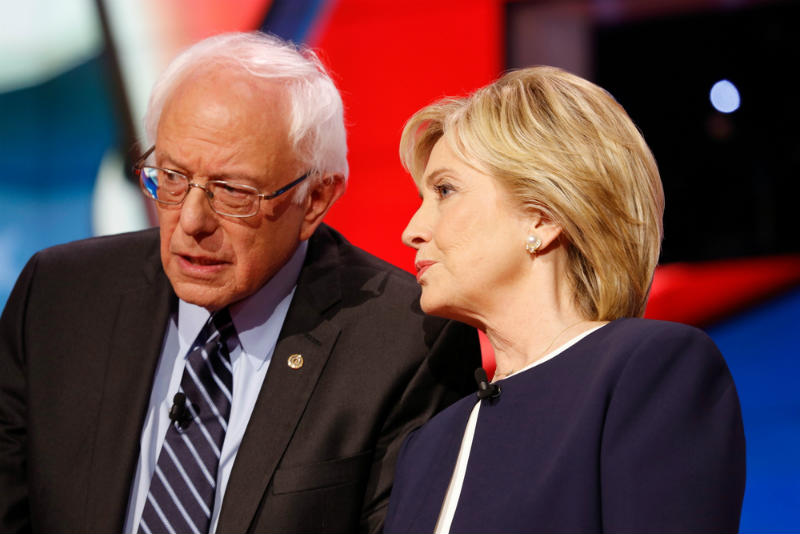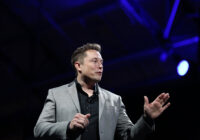US foreign policy is aggressive, parochial and hard-hearted. Unless voters finally demand differently, the next president will be the same.
It’s often said that, in democracies, we get the leaders that we deserve. In the current slugfest masquerading as a presidential race in America, it looks as though we’re getting the leader that our foreign policy deserves. The results of the first round of the 2016 presidential election in Iowa, with narrow victories by Ted Cruz and Hillary Clinton, only underscores this point.
Let me explain.
The Obama administration has engaged in several successful ventures in diplomacy—from negotiating a nuclear deal with Iran and reestablishing relations with Cuba to working with the international community to address climate change. As presidents go, Barack Obama has acted with aplomb as the diplomat-in-chief.
But still, US foreign policy is predicated on violence. We can measure this violence in a variety of ways:
1) The United States spends over $600 billion on the military. That’s three times more than what China spends. That’s also as much as the next seven spenders combined.
2) The US military conducted operations in 147 countries in 2015.
3) The Obama administration is still directly engaged in active wars in Syria, Afghanistan and Iraq.
4) Outside these war zones, the US engages in drone attacks and targeted assassinations in Pakistan, Yemen and Somalia that have killed nearly 2,500 people since Obama took office.
5) The US remains the leading arms merchant in the world. It controls roughly half the market. In 2014 alone, it boosted sales by 35%.
6) The US has 7,200 nuclear weapons in its arsenal. It is spending $1 trillion over the next 30 years on modernizing a force that President Obama, in a celebrated speech in Prague in 2009, pledged to eliminate (though obviously not in the next 30 years).
Obama’s nuclear disarmament speech is emblematic of US policy. The United States often talks a good game when it comes to peace, but it is very reluctant in the end to put down its weapons. Even when the US engages in peaceful negotiations, it makes sure that all the participants in the process understand that “all options” remain on the table.
You’ve heard of shotgun weddings. The US specializes in shotgun diplomacy.
Moreover, US foreign policy has proceeded in this fashion for many decades, at least since our entry into World War II (though our military mindset can be traced back to the decision in the late 18th century to establish a blue-water navy to fight the Barbary pirates). It would be extraordinarily difficult for any one person, even with executive powers, to transform such a system. The major political parties—and, by extension, the voters—have showed no interest in nominating anyone who challenges these central precepts of American power.
In 2016, the prospects of transforming US foreign policy look particularly bleak. In this election cycle, the candidates are not simply embracing violence as a motivating force behind US foreign policy. They are demonstrating, in almost simian fashion, their qualifications for being an alpha male (and female). In other words, they are signaling that only a “strong” leader can project US strength in an uncertain world.
Put more bluntly, the United States is a country on steroids when it comes to national security. It’s no surprise, then, that our leading candidates—and quite a few second-tier ones as well—have made headlines with their ‘roid rages.
Republican Ugly
Foreign policy is never the leading edge in a presidential campaign, which generally revolves around domestic issues, particularly the economy. When talking about the economy, the current candidates often take combative stances—toward the IRS (a rogue agency), Wall Street (blood-sucking leeches), and sometimes even corporations (unpatriotic outsourcers).
But the economy is also a topic that allows successful candidates to show their empathetic side. They must somehow link arms with struggling Americans—and all but a tiny percentage of Americans are struggling with economic challenges—in a bid to appear as “one of us.” Bill Clinton and Barack Obama were able to connect with voters in this way. By contrast, Mitt Romney had a notorious empathy problem in 2012, as did John McCain four years earlier.
This year, the empathy gap is startling. Donald Trump, Hillary Clinton and Ted Cruz all received negative evaluations in the December Quinnipiac poll. That is, a plurality of respondents felt that these candidates didn’t care about the needs and problems of “people like me.” The gap was astonishing with Trump (23%), but it was there for Clinton (5%) and Cruz (1%) as well. Bernie Sanders, not surprisingly, did well on this metric (plus 18%), and perhaps more unusually so did Marco Rubio (plus 7%).
On domestic policy, then, the current favorites are not projecting warm, fuzzy feelings. Even the two candidates with positive numbers come with asterisks. Sanders has more of a hectoring, Old Testament prophet vibe to him, and Rubio is becoming considerably more hard-edged to woo the far-right.
If the candidates have difficulty mustering a modicum of empathy on domestic issues, it’s no surprise that they fail to show compassion on foreign policy issues. Particularly when it comes to the Republicans, international affairs is an opportunity for the presidential candidates to release their inner Neanderthal. Out come the clubs, the grunts, the threats and the posturing to prove that they are not so much “one of us” as “one of the guys.”
Every Republican candidate has promised, on seizing the Oval Office, to tear up the nuclear agreement with Iran. They have engaged in an informal contest to see who can use the most apocalyptic rhetoric for dealing with the Islamic State (winner: Ted Cruz for promising to bomb the would-be caliphate until the sand glows in the dark). They’ve competed in the category of most hateful Islamophobic comment (winner: Ben Carson for opposing the very idea of a Muslim becoming US president). They’ve waxed heartless about immigrants, with Trump leading the way. They’ve engaged in the usual China-bashing, with Carson criticizing Beijing’s imaginary intervention in Syria. And now that Lindsey Graham is out of the race, they have all rejected the overwhelming scientific consensus that the planet is heating up.
The Republicans have indulged in behavior so unbecoming and rhetoric so ugly that, if you somehow found yourself trapped next to one of the candidates in a confined space for a long time, you might very well decide to chew off your leg to escape. That’s the definition of Republican ugly.
And the Democrats?
It would be refreshing—and strategically wise—if the Democrats offered a distinct alternative on international affairs. On the face of it, of course, they do. Both Clinton and Sanders support the Iran agreement, refrain from Islamophobic comments, generally support accepting Syrian refugees into the country, and have no doubts about the reality of climate change.
But dig a little deeper and you’ll find that they embrace the same underlying militarism that informs the Obama administration’s national security policy. Clinton and Sanders offer something different from the Republicans, but not from the current status quo.
Hillary Clinton, for instance, has prided herself on taking more aggressive positions on foreign policy than Obama the candidate (in the 2008 election) and Obama the president (when she was secretary of state). The first time around as a candidate, she considered Obama’s proposed diplomatic overtures to willing adversaries to be dangerously naïve. This time around as well, Clinton has tried to present herself as the more hawkish candidate on Iran, even as she has supported the nuclear deal.
Clinton has also been an advocate of “smart power.” She has used this concept to put diplomacy at “the vanguard of foreign policy.” In reality, however, “smart power” has offered the Pentagon an opportunity to expand its reach beyond hard power. As I wrote during the last presidential election cycle in 2012:
“Always in search of a mission, the Pentagon now has its fingers in just about every pie in the bakery. The Marines are doing drug interdiction in Guatemala. Special Operations forces are constructing cyclone shelters in Bangladesh. The U.S. Navy provided post-disaster relief in Japan after the Fukushima nuclear meltdown, while the U.S. Army did the same in Haiti. In 2011, the Africa Command budgeted $150 million for development and health care.
“The Pentagon, in other words, has turned itself into an all-purpose agency, even attempting ‘reconstruction’ along with State and various crony corporations in Iraq and Afghanistan. It is preparing for the impact of climate change, pouring R & D dollars into alternative energy, and running operations in cyberspace. The Pentagon has been smart about its power by spreading it everywhere.”
As president, Clinton would likely apply her notions of “smart power” across government, making the military the touchstone for how the US engages the world.
Bernie Sanders, as a self-avowed democratic socialist and lifelong progressive, might be expected to take a different position. And indeed, he opposed the Iraq War and has used that example to distinguish his foreign policy acumen from Clinton’s purported experience (which didn’t prevent her from supporting the invasion). He is also skeptical of the US assuming the role of the world’s policeman.
But Sanders, like Obama, does not challenge the notion that the US should have the strongest military in the world and use force when necessary. Like Obama, who recommended ending the “dumb war” in Iraq in order to focus on the “good war” in Afghanistan, Sanders urges Washington to refocus away from the fight against Bashar al-Assad in Syria and toward the Islamic State. He has already altered his position on Israel, moving “from heterodox support for an independent Palestinian state to a far more politically mainstream, generally pro-Israel stance,” as Derek Davison writes in LobeLog.
As president, Sanders might tweak the Pentagon budget by eliminating a few billion dollars of waste. He might scale back on US interventions. But he would more likely continue in the direction in which he has started moving as candidate: demonstrating that he can wield power just like the big boys.
The Price of Power
US foreign policy, basically, is a set of brutal statements about the nature of power in the world: where it resides, how it is maintained. The American people have never elected anyone who has challenged American power projection in any significant way—only presidents who’ve preferred to focus US military attention on one part of the world over another.
Is it realistic to expect any candidate for president to challenge the foreign policy status quo?
Obama shifted US positions on Iran, Cuba and climate change with public opinion on his side. No American executive will think of challenging the national security state without a comparable shift in public opinion. Such a shift would require a sea change in the way Americans think of themselves: a change in culture before a change in policy.
In the meantime, we’ll be stuck with the president we deserve, and more importantly, the one our foreign policy deserves. Our foreign policy is aggressive, parochial and hard-hearted. Don’t be surprised, then, if our next president is the same.
*[This article was originally published by FPIF.]
The views expressed in this article are the author’s own and do not necessarily reflect Fair Observer’s editorial policy.
Photo Credit: Eurobanks / Christopher Halloran / Joseph Sohm / Andrew Cline / Shutterstock.com
 We bring you perspectives from around the world. Help us to inform and educate. Your donation is tax-deductible. Join over 400 people to become a donor or you could choose to be a sponsor.
We bring you perspectives from around the world. Help us to inform and educate. Your donation is tax-deductible. Join over 400 people to become a donor or you could choose to be a sponsor.
Support Fair Observer
We rely on your support for our independence, diversity and quality.
For more than 10 years, Fair Observer has been free, fair and independent. No billionaire owns us, no advertisers control us. We are a reader-supported nonprofit. Unlike many other publications, we keep our content free for readers regardless of where they live or whether they can afford to pay. We have no paywalls and no ads.
In the post-truth era of fake news, echo chambers and filter bubbles, we publish a plurality of perspectives from around the world. Anyone can publish with us, but everyone goes through a rigorous editorial process. So, you get fact-checked, well-reasoned content instead of noise.
We publish 2,500+ voices from 90+ countries. We also conduct education and training programs
on subjects ranging from digital media and journalism to writing and critical thinking. This
doesn’t come cheap. Servers, editors, trainers and web developers cost
money.
Please consider supporting us on a regular basis as a recurring donor or a
sustaining member.
Will you support FO’s journalism?
We rely on your support for our independence, diversity and quality.









